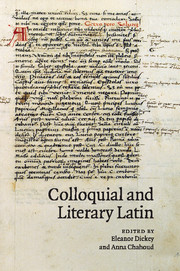Book contents
- Frontmatter
- Contents
- List of contributors
- Acknowledgements
- Foreword (David Langslow)
- PART I THEORETICAL FRAMEWORK
- PART II EARLY LATIN
- PART III CLASSICAL LATIN
- PART IV EARLY PRINCIPATE
- PART V LATE LATIN
- 22 Late sparsa collegimus: the influence of sources on the language of Jordanes
- 23 The tale of Frodebert's tail
- 24 Colloquial Latin in the Insular Latin scholastic colloquia?
- 25 Conversations in Bede's Historia Ecclesiastica
- Abbreviations
- References
- Subject index
- Index verborum
- Index locorum
22 - Late sparsa collegimus: the influence of sources on the language of Jordanes
Published online by Cambridge University Press: 04 April 2011
- Frontmatter
- Contents
- List of contributors
- Acknowledgements
- Foreword (David Langslow)
- PART I THEORETICAL FRAMEWORK
- PART II EARLY LATIN
- PART III CLASSICAL LATIN
- PART IV EARLY PRINCIPATE
- PART V LATE LATIN
- 22 Late sparsa collegimus: the influence of sources on the language of Jordanes
- 23 The tale of Frodebert's tail
- 24 Colloquial Latin in the Insular Latin scholastic colloquia?
- 25 Conversations in Bede's Historia Ecclesiastica
- Abbreviations
- References
- Subject index
- Index verborum
- Index locorum
Summary
INTRODUCTION
Unlike some other authors of the sixth century ad, such as Cassiodorus, the historian Jordanes has received very little attention in modern scholarship. Besides, the evaluation of his language and style has been since Mommsen an unfavourable one, for two reasons. The first is that, since both his works are epitomes, Jordanes often employs large sections of previous authors – from the second to the sixth century ad – sometimes copying them word for word (Bergmüller 1903: 3 defines him a ‘Kompilator ersten Ranges’); the other reason is that his texts contain, at least in Mommsen's (1882) edition, several late and substandard features as compared to the ‘good’ classical Latin, that is ‘the standard language in the late Republic and early Empire’. The aim of this paper is to connect, in some way, these two aspects: on the one hand, I shall show how crucial an exact knowledge of the sources is to a precise understanding of Jordanes' language; on the other, I shall discuss some morphological and syntactic peculiarities of his works. Special attention will be given here to a few substandard usages that can be considered ‘colloquialisms’, that is to those features which are normally excluded from literary sources of the (post-) classical period and, on the ground of several parallels in authors of the same period and, especially, in non-literary and extra-literary sources, are likely to have been widespread in the spoken varieties of late Latin.
- Type
- Chapter
- Information
- Colloquial and Literary Latin , pp. 357 - 375Publisher: Cambridge University PressPrint publication year: 2010



